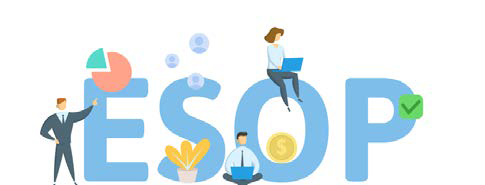Why it matters for Islamic Financial Institutions
Ownership of enterprises has evolved over the years, from investor-owned enterprises, and customer-owned enterprises to employee-owned enterprises. Besides this, there are government ownership, foreign ownership, management (employees) ownership and local ownership structures.
Whereas investor-owned enterprises constitute majority of the ownership form, employee-owned enterprises exists and continue to emerge around the world. Employee-owned enterprises existed mostly in service industries such as law, accounting, investment banking, management consulting, advertising, engineering and medicine. Employee ownership is not a simple and one-dimensional concept, rather has a variety of forms. (Caramelli, 2011).


Currently, there are fully employee-owned and partially employee-owned enterprises. Employee Share Ownership Plans (ESOP) is one mechanism that can be used to turn the investor-owned company into a partial or fully employee-owned enterprise; popular in the United States. Another U.S. approach is an employee stock purchase plan (ESPP), where employees typically receive a discount on the market price and purchase shares on a few predetermined days.
Defining ESOPs
Employee share or stock ownership plans (ESOPs) have been defined in varieties of ways. According to Gates and Saghir (1995), employee share ownership plans refer to set of rules governing the acquisition, allocation and management of shares held for employees. Others have defined employee share ownership plans as contracts between the employee (or grantee) and the employer (or grantor) that give the employee right but not the obligation to purchase common shares or stock from the employer for a specific price for specified period of time (Olagues and Summa, 2010).
Globally, employee share ownership plans are popular in some developed and developing countries. For example, according to the National Center for Employee Ownership in the US estimated that there are 6,669 ESOPs as of 2018. In the UK, it is estimated that there were 1,760 firms with variety of share ownership schemes. However, in other European countries, 30% and 5% of the establishments have profit-sharing and employee-share ownership plans respectively (Pendleton, 2010).
Each country has legal provisions for the establishment of ESOPs. Practically, employee share ownership plans (ESOPs) comes into existence by the approval of corporation management i.e. board of directors and shareholders. ESOPs are often structured as a separate legal entity such as a trust, which holds employee shares in an individual account according to the terms of the trust (Gates and Saghir, 1995).
Employee Share Ownership Plan Designs
Employee share ownership plans are designed differently depending on who incur the costs or what is the source of funds used to purchase the shares. Also, the designs may vary depending on the employee ownership form which range from nominal stake to full collective stake.

Based on who incurs the cost, employee can obtain shares as a grant (popular in USA’s ESOPs) or can obtain share through loan that is paid back by the company profits or obtain shares using their own money (such as 401(k) plans in US) or employee can obtain shares based on the market price or based on a discounted price. In ESOPs design based on the source of funds, employee can obtain shares through employer matching contribution, profit-sharing bonus or through funds borrowed by trust fund from lenders (Caramelli, 2011).
Why Islamic Financial Institutions Should Have ESOPs?
According to IFDI report of 2021, there are 1524 Islamic financial institutions (IFI) around the globe with total assets of USD2.8 trillion as of 2019. IFIs play a crucial role in the financial intermediation and wealth management. A crucial component in wealth management is creating and accumulating wealth. In light of the above, below are some of the arguments for the establishment of ESOPs in Islamic financial institutions such as Islamic banks, Islamic insurance, Islamic fund managing firms, Islamic microfinance institutions among others.
Agency Problem
Under agency theory, modern-day corporation faces agency problems as a result of separation of owners/shareholders (principal) and managers (agent), different risk preference between owners and manager and moral hazards among others. There are several remedies to the agency problem. One of them is managerial ownership, which is providing shares/stock of the firm to top management and employees in order to increase attachment to the firm. In this context, ESOPs as a form of an equity-based compensation scheme under wider discussion on managerial compensation has been justified based on the need to control agency problem that exists between shareholders and managers. Therefore, ESOPs in IFIs may serve as a mechanism to co-align not only the conflicting interests of managers and owners but also between managers and customers.
Instrument of Corporate Finance
Depending on the way in which ESOPs are structured, ESOPs can act as a source capital to the firm. ESOPs becomes a technique of corporate finance when allocated shares are bought by employees from their own funds rather than given as reward for performance. Employee purchase of the shares brings in capital that can enable the company to pursue its growth plans among others.
Instrument of Wealth Creation and Accumulation
Globally, we see there is dominant investor capitalism in which some wealthy individuals and company bodies invest in the formation or takeover of other companies. The investors put in their money and let the employees manage and run the business. Whereas employees are paid for their work, investor are rewarded only when the company generate profits or sometimes end up with losses. In the spirit of Musharaka (profit or loss sharing), employee shares ownership plan provides an opportunity for employees to be internal investors. Besides their monthly salary, employees will bear the fruits of their performance as well as the pain of non-performance. As a result, ESOPs becomes an opportunity to invest, create and generate income for employees.
Employee Productivity
Employee productivity is essential for the success of any business enterprise and more so to the Islamic financial institutions since Islam emphasise on optimal use of resources, be it capital or labour.
ESOPs when used as an incentive tool tied with performance are likely to boost employee productivity since the reward of it is shared between internal investors (employees) and external investors (shareholders). Besides, the company with ESOPs may experience increased profitability, worker’s retention, tax advantages (for leveraged ESOPs), additional source of corporate finance through leveraged employee share ownership plans, provide hostile takeover defense, align employee’s interests with company’s long-term financial health, improved management-labour relations and provide smooth corporate succession. Furthermore, employee share ownership plans are associated with benefits such as providing retirement security, job stability, higher wages, participation in company’s earnings and tax-free contribution (particularly in US whereby employee share ownership plans are considered as another form of pension plans).
ESOPs Criticism
In line with the spirit of Qur’an that says “do justice when you speak”, ESOPs have their own criticism, which differs from one design to another. For example, some ESOPs are criticised on the ground of concentration of risks as the company will be deriving capital and labour from a single source. Also, ESOPs designs where employee use own funds to purchase shares, expose these employees to financial risks as a result of concentrating their wealth into one asset class, which is their company’s share. This risk is demonstrated by the failure of Enron and United Airlines in United States where employees had invested in.
Some studies in the US have challenged the notion that employee ownership does not automatically improve productivity or profitability of the firm (Gates & Saghir, 1995). However, studies conducted in Kenya have shown a positive relationship between employee share ownership plans and financial performance of the firm (Khisa, 2016) as well as earning per share (Wanjiku, 2017).
ESOPs from Shari’a Perspectives
To conclude, ESOPs are designed differently and for different purposes, requiring thorough comprehension of each design to come to an acceptable Shari’a ruling. Fortunately, there is ongoing deliberation which shall be presented in the future because the details of it are beyond the scope of this article. Nonetheless, it is critical for Islamic financial institutions themselves through Shari’a research function of the Shari’a departments to thoroughly investigate ESOPs designs, detect Shari’a violations if any, remove the violations and align it with Islamic rules in order to harness potential benefit of ESOPs to the stakeholders.

ESOPs are designed differently and for different purposes, requiring thorough comprehension of each design to come to an acceptable Shari’a ruling



